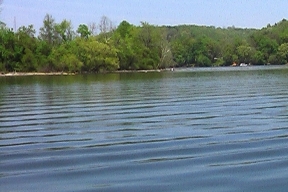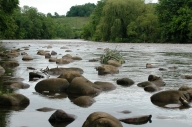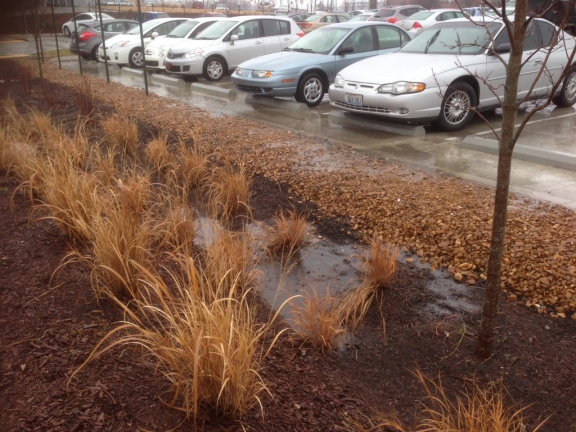Water
Having clean water to drink is necessary for good health. In addition to water for drinking, water is needed for making baby formula, preparing foods, flushing toilets, brushing teeth and showering. Tennessee communities get their water from a variety of sources that need to be managed and protected including rivers, lakes and groundwater. To keep people safe, the state monitors public water supplies and permits septic systems. Water is an important natural resource for recreation, wildlife and industry. Some communities are suffering from not having enough water due to increasing demand or drought. The opposite extreme of having too much water and flooding has devastated communities. Available water, appropriate drainage and good water quality are important livability indicators for a healthy community.

Why is water quality important to health?
Where does drinking water come from?
Define groundwater and surface water?
Who inspects water quality?
Where can I get water quality test results?
What about private water wells?
What about septic systems?
How do I test my water quality?
What is storm water?
What about flooding?
What is value of conservation?
Waterfront development?
Where to get data about water quality?
Should pharmaceuticals be flushed down the drain?
What are things to do to protect water quality?
Government partners
Additional resources
Why is water quality important to health?
Water is essential for life and plays a vital role in the proper functioning of the Earth's ecosystems. The amount of fresh water on earth is limited. Water pollution has a serious impact on all living creatures and can negatively affect the use of water for drinking, household needs, recreation, fishing, transportation and commerce.
We are made up of two-thirds water. The quality of water we drink and bathe in is important for our bodies to stay healthy, for us to be hydrated, regulate our body temperature, remove toxins from our body and to lubricate our body’s digestive tract and other body processes.
What is water fluoridation?
Fluoride is a naturally occurring element. It is present in the waters of rivers, lakes, springs and wells at varying levels. Water fluoridation is the adjustment of the natural level of fluoride to a level that is optimal for oral health. More than 60 years of medical research has demonstrated the health benefits of adjusting fluoride levels in drinking water, particularly for dental health. More information about fluoridation can be found on TDH’s Fluoride Facts webpage.
Where does drinking water come from?
Drinking water comes from one of two sources: groundwater or surface water. Depending on where you live in Tennessee, your drinking water may come from groundwater, a water source below the ground or a spring that comes out on top of the ground, or surface water which is typically from streams, rivers or lakes.
Define groundwater and surface water?

Ground water originates from precipitation that falls in the form of rain or snow and seeps into the ground, filling the open spaces, or pore space, within layers of sand or gravel beneath the land surface. Under the ground there is a layer where the soil or rock is completely saturated with water. Layers of sand and gravel or rock in this saturated zone are called aquifers. An aquifer is a geologic formation containing enough water such that it can be pumped out from a well. The well pumps water to the surface where the water company treats it to ensure that it is safe to drink. It is then pumped into a storage tank and upon demand by the customer, flows through distribution pipes into the home and ultimately to the faucet.
Another form of groundwater is a spring. A spring is groundwater that flows out onto the surface from a parting in the side of a mountain or hill. Spring water is not generally treated unless the individual homeowner using the spring as a water source installs a treatment system.
Surface water also originates from precipitation. The precipitation reaches the land surface and recharges rivers, lakes, wetlands and other surface water bodies directly. Water is pumped from the water body to a treatment plant and then follows the same path as ground water on its way to the consumer.
Who inspects water quality?
If you live in a city or town that provides water to its citizens, the water utility distributing the water must ensure the water quality. Testing for microorganisms and biological or chemical contaminants is done by the water utility. The testing is done on the raw water before it is treated and distributed to the users. Treatment usually involves flocculation, filtration, chlorination, fluoridation and polishing using carbon for odor and taste.
If your water source is your own well, spring or pond, then you are responsible for the quality of your water. You should do periodic testing to ensure its quality. Find out whether waters near you are clean and safe for activities such as swimming and fishing, for example check swimming area closures and fish advisories.
Where can I get water quality test results?
If your city or town provides your water, the test results are typically mailed to your home once each year. These reports are sometimes called Consumer Confidence Reports. Many water utilities have the latest testing information on their websites. The U.S. Geological Survey also has publications on the quality of regional water sources throughout Tennessee.
What about private water wells?
If you build your home in an area without water provided by a city or town you must install your own water household source. The source of water can be from a drilled well, pond or spring. If you drill a well, the well drilling company must obtain a permit and report his findings to the state. The driller is responsible for “disinfecting” the water well before it is used. The owner of the well, pond or spring source is responsible for any water quality testing. This includes testing for micro-organisms and any biologic or chemical contaminants. If you desire to disinfect or treat your water in any way, you are responsible for the purchase of any treatment system. All maintenance of the well, including the pump, piping and any treatment system is the responsibility of the well owner. Information on how water wells work and maintenance required for water wells can be found at TDEC's website, CDC’s website or Wellowner.org.
What about septic systems?
According to the Tennessee Department of Environment and Conservation, a septic system is a type of small-scale sewage treatment system common in areas with no connection to main sewage pipes provided by local governments or other entities. Typically, homeowners that have their own septic system are in relatively rural areas. Persons who will be constructing, installing, altering, extending or repairing a subsurface sewage disposal system are required to have a valid permit. Homeowners must maintain their septic systems. According to the U.S. Environmental Protection Agency, the average household septic system should be inspected at least every three years by a septic service professional. Household septic tanks are typically pumped every three to five years.
Be SepticSmart. If you have a home septic system, regular maintenance saves money AND helps protect the environment. Have your system inspected every three years. Avoid pouring fats, grease or solids down the drain. Remind guests not to park or drive on the drainfield. Learn more ways you can be SepticSmart.
How do I test my water quality?
If you have your own well you are responsible for ensuring your water is safe from contaminants. Your local health department or state environmental division may be able to provide you with a list of common contaminants for which you can have your water tested. To get good results, typically samples will have to be collected in several bottles supplied by a testing laboratory. These samples must then be taken to the lab and tests run. Quick test kits for lead and microorganisms like those found at your local hardware store can be less reliable and precise than collecting a sample and bringing it to a water testing laboratory.
What is storm water?
According to the U.S. Environmental Protection Agency, stormwater is generated from rain and snowmelt events that flow over land or impervious surfaces, such as paved streets, parking lots and building rooftops and does not soak into the ground. The runoff picks up pollutants like trash, chemicals, oils and dirt that can harm our rivers, streams, lakes and coastal waters. To protect these water resources, communities, construction companies, industries and others use stormwater controls known as best management practices (BMPs) to filter out pollutants and/or prevent pollution by the pollutants at their source.
Learn how pollutants can get into the water supply, and actions or treatment to remove them.
- Managing Stormwater
- Regulating Pollution
- Septic Systems
- Funding Water Infrastructure

Example of a rain garden which controls and filters storm water. This storm water strategy is becoming more common for storm water management.
What about flooding?
Flooding can cause water supplies to become polluted. Floodwaters pick up and carry pollutants far distances. Wells, springs, lakes and even municipal water supplies can become impacted by raw sewage and other hazardous or toxic substances that may be in the flood water. The EPA’s Flooding website has good information about flooding and floodwater.
What is the value of conservation?
Click the hyperlinks below to learn about EPA's work to protect and manage water resources and what you can do to help.
- Ground Water
- Lakes
- Oceans, Coasts, Estuaries and Beaches
- Nutrient Pollution - Nutrient pollution, one of America's most widespread, costly and challenging environmental problems, is caused by excess nitrogen and phosphorus in the air and water.
- Rivers and Streams
- Watersheds - The area that drains to a common waterway, such as a stream, lake, estuary, wetland, aquifer or even the ocean.
- Wetlands - Areas where water covers the soil or is present either at or near the surface of the soil all year or for varying periods of time during the year, including during the growing season.
What about Waterfront Development?
A thriving and active waterfront has been a common thread for great cities and urban centers, though the relationship of cities with their waterfront has undergone a series of transformations. In the industrial era, manufacturing and maritime activities such as shipyards, warehouses and heavy industries dominated properties along the water, which served as an important transportation corridor. As the World Bank explains, in the post-industrial era, many cities are realizing the potential of reinventing waterfront properties into thriving economic engines and hubs of social activity through the creation of parks, amphitheaters and areas of residential and retail development.
Where to get data about water quality?
The Tennessee Department of Environment and Conservation (TDEC) and the U.S. Geological Survey (USGS) have information on the water quality in specific areas and regions throughout the state. The Centers for Disease Control and Prevention (CDC) has general information on water quality. You may contact your local TDEC office at 1-888-891-TDEC (8332) to learn more about water quality or visit the USGS’ water quality information pages. CDC’s water quality and testing webpage is another good resource.
For fish advisories, the Tennessee Department of Environment and Conservation’s Division of Water Resources issues fish advisories in Tennessee. The Tennessee Department of Wildlife Resources (TWRA) website has the most up-to-date advisories posted. These advisories are updated as needed by the Department.
Should pharmaceuticals be flushed down the drain?
Do not flush your unwanted or expired medications. Pharmaceuticals and their by-products are now found in streams, lakes and in drinking water.
According to the U.S. Food and Drug Administration, Consumers can visit the DEA’s website for more information about drug disposal and to locate an authorized collector in their area. Consumers may also call the DEA Office of Diversion Control’s Registration Call Center at 1-800-882-9539 to find an authorized collector in their community. Local law enforcement agencies may also sponsor medicine take-back programs in your community. Contact your city or county government for more information on local drug take-back programs. Some pharmacies now take medications back. Ask your pharmacist about proper disposal, too. The Tennessee Department of Environment and Conservation lists some take back options.
Otherwise, almost all medicines can be thrown in the household trash, but consumers should take the precautions described below. Scratch out all identifying information on the prescription label to make it unreadable. Do not give your unwanted medicines to friends.
If no disposal instructions are given on the prescription drug labeling and no take-back program is available in your area, throw the drugs in the household trash following these steps: (1) Remove them from their original containers and mix them with an undesirable substance, such as used coffee grounds, dirt or kitty litter (this makes the drug less appealing to children and pets and unrecognizable to people who may intentionally go through the trash seeking drugs); and (2) Place the mixture in a sealable bag, empty can or other container to prevent the drug from leaking or breaking out of a garbage bag.
What are things to do to protect water?
Read about actions you can take to protect water at home and in your community.
- Find Healthy Watersheds Projects in Your Area - Learn about opportunities to get involved in activities such as volunteer water monitoring, stream cleanups, and storm drain marking.
- Disaster Preparedness - Natural disasters such as hurricanes and floods can disrupt your drinking water supply and your wastewater disposal systems. Learn some of the issues you may face preparing for, during and after an event that directly threatens your health and the health of your family.
- Maintain Your Septic System - If you’re not properly maintaining your septic system, you’re not only hurting the environment, you’re putting your family’s health at risk—and may be flushing thousands of dollars down the drain.
- Volunteer Monitoring - Across the country, trained volunteers are monitoring the condition of their local streams, lakes, estuaries and wetlands.
- WaterSense - Save water and protect the environment by choosing WaterSense labeled products in your home, yard, and business and taking simple steps to save water each day.
Government partners
Tennessee Department of Environment and Conservation (TDEC)
Division of Water Resources
www.tn.gov/environment/program-areas/wr-water-resources-home.html
Fish Advisories
www.tn.gov/environment/program-areas/wr-water-resources/watershed-stewardship/bacteriological-and-fishing-advisories.html
Tennessee Department of Health (TDH)
Environmental Epidemiology – Private Water Supply
U.S. Environmental Protection Agency (EPA)
Learn about Water
www.epa.gov/learn-issues/learn-about-water
Centers for Disease Control and Prevention (CDC)
Clean Water for Health
www.cdc.gov/nceh/hsb/cwh/default.htm
U.S. Geological Survey (USGS)
Geology/Water
www.usgs.gov/water
Additional resources
U.S. Food and Drug Administration (FDA)
Disposal of Unused Medicines
www.fda.gov/Drugs/ResourcesForYou/Consumers/BuyingUsingMedicineSafely/EnsuringSafeUseofMedicine/SafeDisposalofMedicines
WebMD
The Wonders of Water
www.webmd.com/a-to-z-guides/features/wonders-of-water?page=3
Tennessee Clean Water Network
Environmental Education in Tennessee
www.tcwn.org
Tennessee Recreation and Parks Association (TRPA)
Benefits of Parks and Recreation
www.trpa.net
Tennessee Valley Authority (TVA)
Environment
www.tva.com/Environment